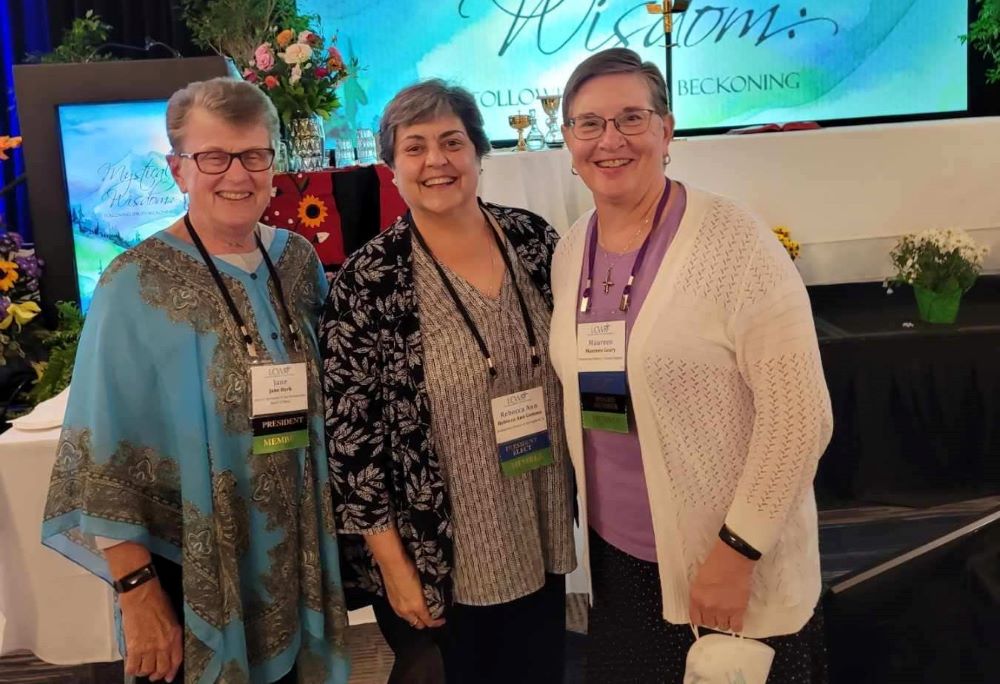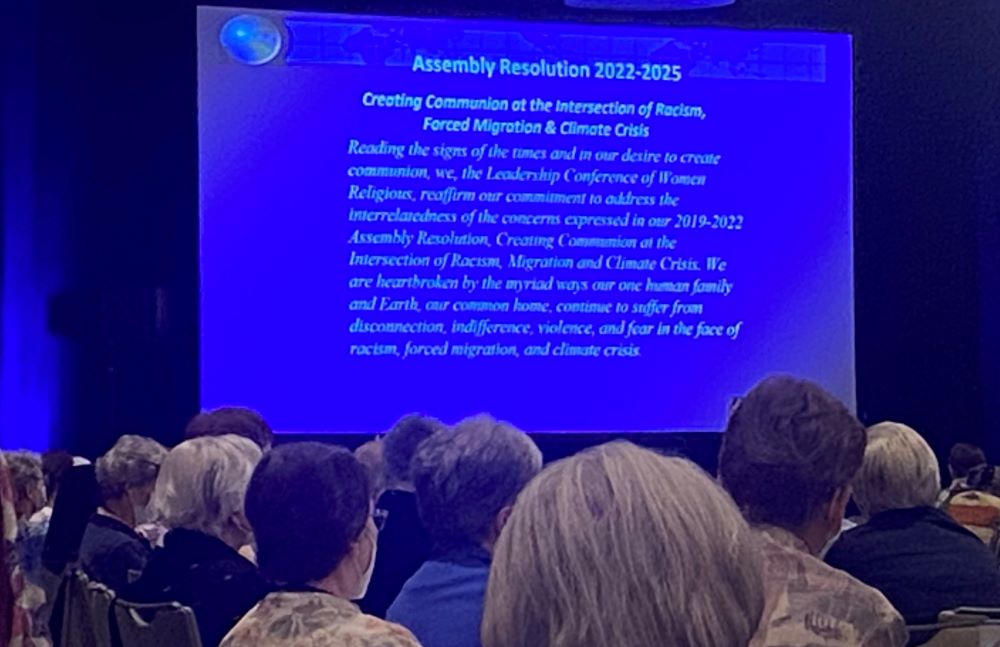
The new LCWR presidential team, for 2022-2023 includes, from left, Jane Herb, a Sister, Servant Immaculate Heart of Mary, now the past-president; Springfield Dominican Sr. Rebecca Ann Gemma, president; and Grand Rapids Dominican Sr. Maureen Geary, president-elect. (Photo by Gail DeGeorge)
With a focus on social justice, the Leadership Conference of Women Religious concluded its Aug. 9-12 general assembly — its first in-person gathering since the pandemic began — with an eye on the issues that will guide their commitments for the next three years and a celebration of their transfer of leadership.
Sr. Maureen Geary becomes president-elect of LCWR, a member organization of congregational leaders that represent 80% of Catholic sisters in the United States. She is one of the three-member presidential team.
A councilor for the Dominican Sisters of Grand Rapids, Michigan, Geary is in her 16th year of congregation leadership and has served on the LCWR national board and several committees. She has worked as a certified public accountant and attorney. She also served in ministries with the Diocese of Grand Rapids secretariat for social justice and the Kent County Coalition to End Homelessness.
Springfield Dominican Sr. Rebecca Ann Gemma moved into the president role. Sr. Jane Herb of the Sisters, Servants of the Immaculate Heart of Mary became past president.
Even as Adrian Dominican Sr. Elise Garcia completed her term in the presidential triumvirate, Sr. Carol Zinn, executive director of LCWR, told her, to appreciative laughs, "it is not over." Zinn thanked Garcia for her leadership during a particularly difficult time given the pandemic, which created a myriad of challenges for congregations and LCWR, including holding two virtual assemblies.
She called Garcia a "manifestation of global sisterhood; you are the living invitation to porous borders." Zinn noted that Garcia has "an incredible capacity to create integrative partnerships and clearly the Gospel message in the public square is what your life is about."

The conference voted to reaffirm the 2019-2022 resolution for the next three years through 2025, prioritizing projects and efforts that focus on the intersection of racism, forced migration and the climate crisis. (Photo by Soli Salgado)
LCWR voted to renew the focus of its 2019-2022 resolution: seeking communion at the intersection of racism, forced migration and the climate crisis. Those three issues will once again serve as a North Star for the conference through 2025. A resolution that had been workshopped in communal discernment ahead of this year's general assembly, and which the sister leaders soundly reaffirmed Aug. 12.
"We are heartbroken by the myriad ways our one human family and Earth, our common home, continue to suffer from disconnection, indifference, violence, and the fear in the face of racism forced migration and climate crisis," the resolution stated, the outcome of "reading the signs of the times" and the "desire to create communion."
"Responding to God who loves all creation into being, we recommit ourselves to initiating and supporting opportunities to create a union and to more deeply examine the root causes of injustice," with the intersection of racism, forced migration and the climate crisis being granted priority in projects and actions that the sisters take on for the next three years. "We recognize a sense of urgency and pledge prayer, education action and advocacy. We will use our collective voices, resources, and influence in collaboration with others to establish justice, which reflects God’s creating love."

Each day of the assembly, St. Joseph Sr. Celeste Mokrzycki painted her impression of the assembly, an artistic endeavor in line with the theme "Mystical Wisdom: Following Spirit's Beckoning." (Photo by Soli Salgado)
LCWR's Global Concerns Committee presented the resolution before inviting a moment of quiet contemplation and then table discussions. Sisters shared their comments with the wider assembly. One table noted that the resolution is something that congregations of all sizes and charisms can "buy into," and that puts them "in alignment with Laudato Si'," serving as an extension of Pope Francis' encyclical regarding care of the Earth as our common home.
One sister said that to fulfill this commitment so that it isn't "just talk," LCWR could serve as a resource for their congregations, similar to how they put out a call for volunteers to the U.S. southern border on behalf of Catholic Charities in recent years, while another sister requested ongoing educational resources that explore how these issues intersect.
The location of the assembly — St. Louis — also served as a symbol of this intersection of issues: near the grounds of the St. Louis Gateway Arch, which is near the courthouse infamous for the Dred Scott decision (racism), as well as the Gateway Museum that focuses on Native Americans and pioneers expanding westward (migration and exploitation of indigenous peoples), and looking to the Mississippi River, the lifeblood of the region (climate).
Following speeches readings about the history of racism in Missouri, as well as the harmful effects of the Mississippi River being the second most-polluted waterway in the country (which, the presenters noted, disproportionately affects St. Louis' Black population), sisters engaged in a symbolic justice action through prayer. Led in both English and Spanish, each prayer had the sisters face one of the four cardinal directions, ending with their hands facing the Earth, the heavens, and last, their hearts.
"Help us to remember the breath of life that comes from all our relations and interconnectedness of all creation," they prayed, facing east.
Advertisement
Another afternoon session included briefly celebrating the 50th anniversary of Network, which advocates for legislation in line with Catholic social teaching.
Mary Novak, the executive director, said that Network's "inter-congregational ministry" was and is a charism of "collaboration and listening," and that the organization is recommitting itself to its founding spirit: "healing the divisions in our society by shaping federal policy to dismantle systemic racism, to center equity and reparatory justice, to protect our democracy, and to protect our common home."
Garcia presented Novak with a check for $100,000 in "anticipation and support for the next 50 years of transformative political engagement."
Zinn closed the conference — before the traditional banquet and awards presentation — with a final blessing for leadership: "May we be led always to this deeper place of mystical wisdom, may God be the one that leads us out of this room when we leave and go back home."







